
Access to reliable salary data is crucial for companies aiming to remain competitive in today’s job market. Salary surveys provide organizations with valuable insights into industry pay trends, enabling them to offer attractive and equitable compensation packages.
A 2024 study revealed that 73% of employees would consider leaving their current job for a higher paycheck, underscoring the importance of staying competitive with salary offerings. Salary survey data providers help HR professionals make data-driven decisions, ensuring their compensation strategies align with market standards.
This guide will explore the top salary survey data providers for 2025, offering you the tools to build a fair and competitive compensation strategy.
Salary survey data providers are companies or organizations that collect, analyze, and distribute information about compensation and benefits across various industries, job roles, and geographic locations. These providers typically gather data through surveys of companies, employees, or both, offering valuable insights into salary trends, pay ranges, bonus structures, and benefits packages.
The data they collect helps businesses, HR professionals, and recruiters to benchmark salaries, understand competitive compensation packages, and make informed decisions on salary offers, promotions, and overall compensation strategies. These surveys can be industry-specific, covering sectors like technology, healthcare, finance, or manufacturing, or they can provide broader data applicable to various fields.
Next, we’ll explore the Top 6 salary survey data providers to help you understand where to find the most reliable compensation insights.
Finding the right salary survey provider can make all the difference in building a fair and competitive compensation strategy. With so many options available, it’s important to choose one that aligns with your industry, location, and company size while offering accurate, up-to-date insights.
This is a handy comparison table for the top providers that HR professionals trust for compensation benchmarking.
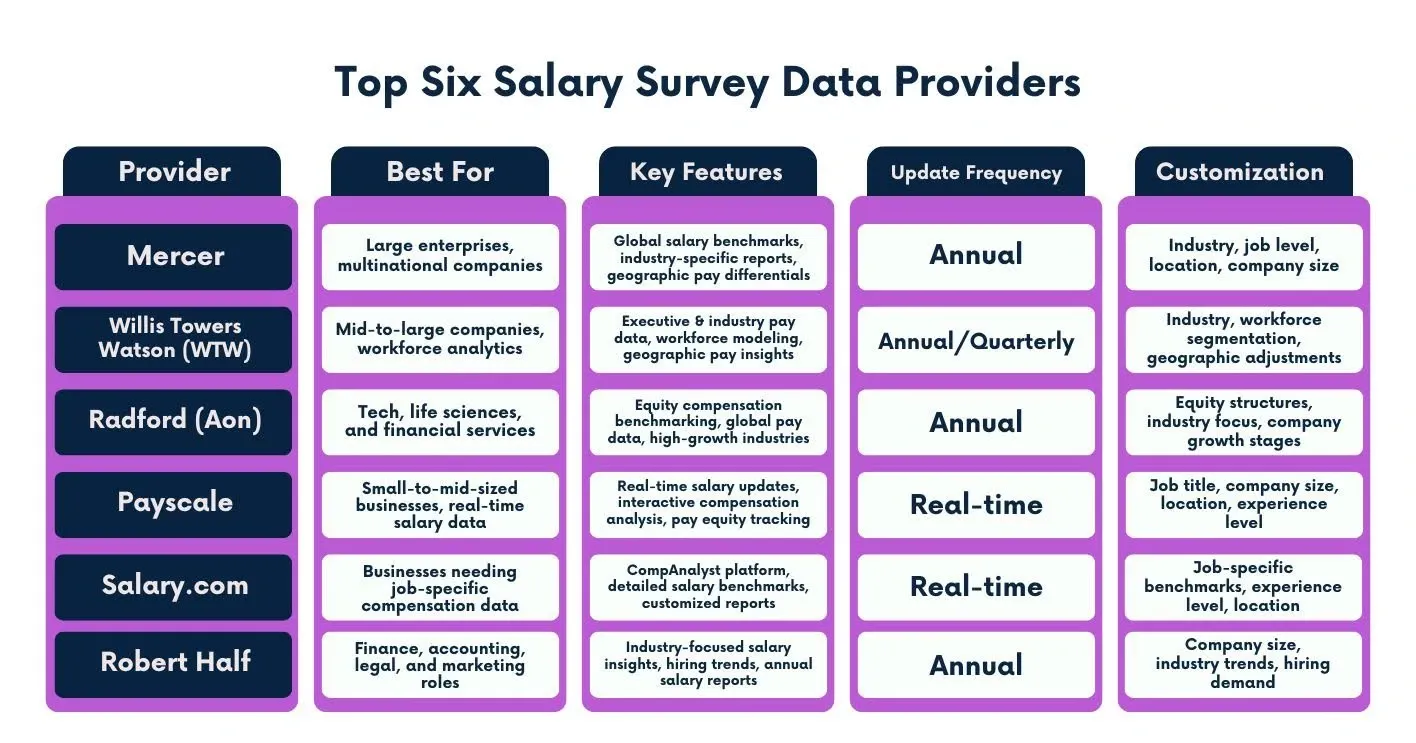
These salary survey data providers are explained in greater detail below:
Best for: Large enterprises, multinational companies, and industry-specific pay benchmarking
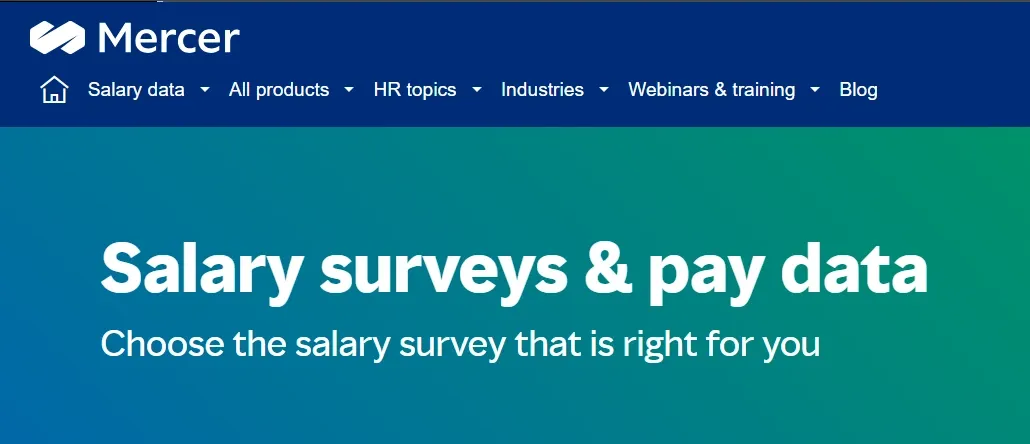
Mercer is one of the most widely recognized compensation data providers in the world. Their Total Remuneration Surveys (TRS) cover over 130 countries, offering detailed compensation insights across various industries and job levels.
Mercer collects data directly from verified employer submissions, ensuring accuracy and reliability. One of Mercer’s key strengths is its industry-specific reports, which provide targeted insights for healthcare, technology, finance, manufacturing, and more.
Why Choose Mercer?
If your company operates globally or across multiple industries, Mercer’s extensive regional and international salary databases make it one of the most valuable resources for multinational compensation planning.
Suggested Read: Building Pay Bands Using Market Reference Points and Benchmark Data
Best for: Mid-to-large companies, organizations needing pay structure modeling and workforce analytics
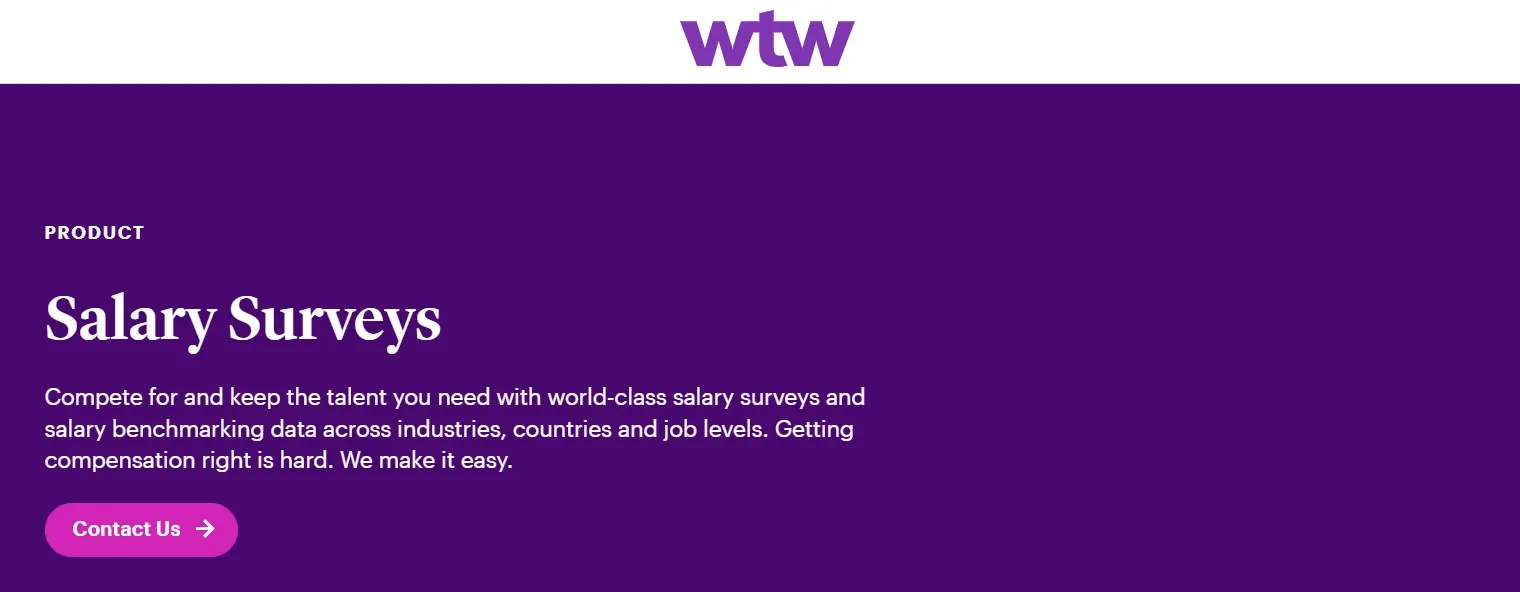
Willis Towers Watson (WTW) is known for its highly detailed compensation surveys that help companies benchmark salaries, develop pay structures, and maintain internal equity. Their surveys cover a wide range of industries and job functions, including executive compensation, broad-based employee pay, and specialized industry insights.
WTW’s compensation database is widely used by businesses that require deep analytics, workforce trends, and salary structure modeling. Their reports provide geographic pay differentials, making it easier for companies to adjust salaries based on cost-of-living variations across different regions.
Why Choose WTW?
WTW is ideal for businesses looking for customizable salary benchmarks, workforce analytics, and advanced pay structure modeling tools to support long-term compensation planning.
Best for: Technology, life sciences, and financial services industries
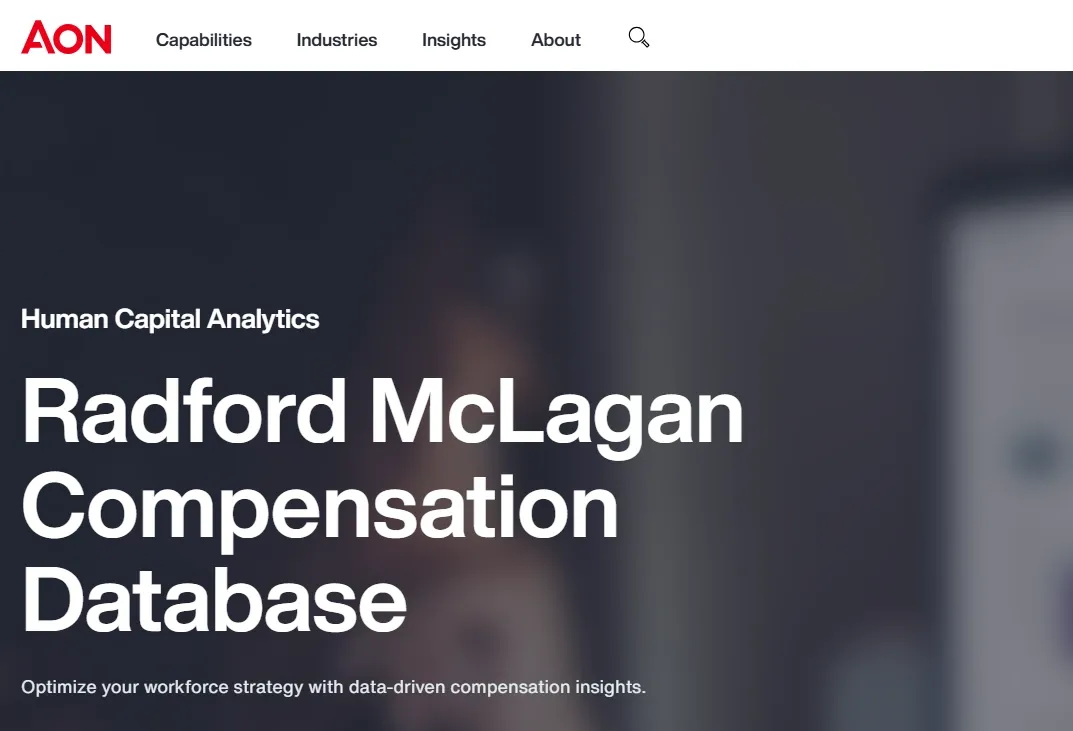
Radford, a part of Aon, specializes in compensation benchmarking for high-growth industries, including technology, life sciences, and financial services. Their database provides insights into base pay, equity compensation, bonuses, and other incentives, making it a go-to resource for companies in competitive talent markets.
Radford surveys focus heavily on startup-to-enterprise-level pay trends, helping businesses understand how salaries shift from early-stage growth to corporate expansion.
Their reports also include global benchmarking, making them especially useful for companies hiring across multiple regions. Many tech companies rely on Radford’s equity compensation data to determine stock options, RSUs, and other long-term incentive structures.
Why Choose Radford?
For those in tech, biotech, or financial services, Radford offers invaluable industry insights and equity compensation benchmarks, establishing it as a top choice for maintaining competitiveness in rapidly changing talent markets.
Suggested Read: Understanding the Importance of Compensation Management
Best for: Small to mid-sized businesses, companies looking for real-time salary data
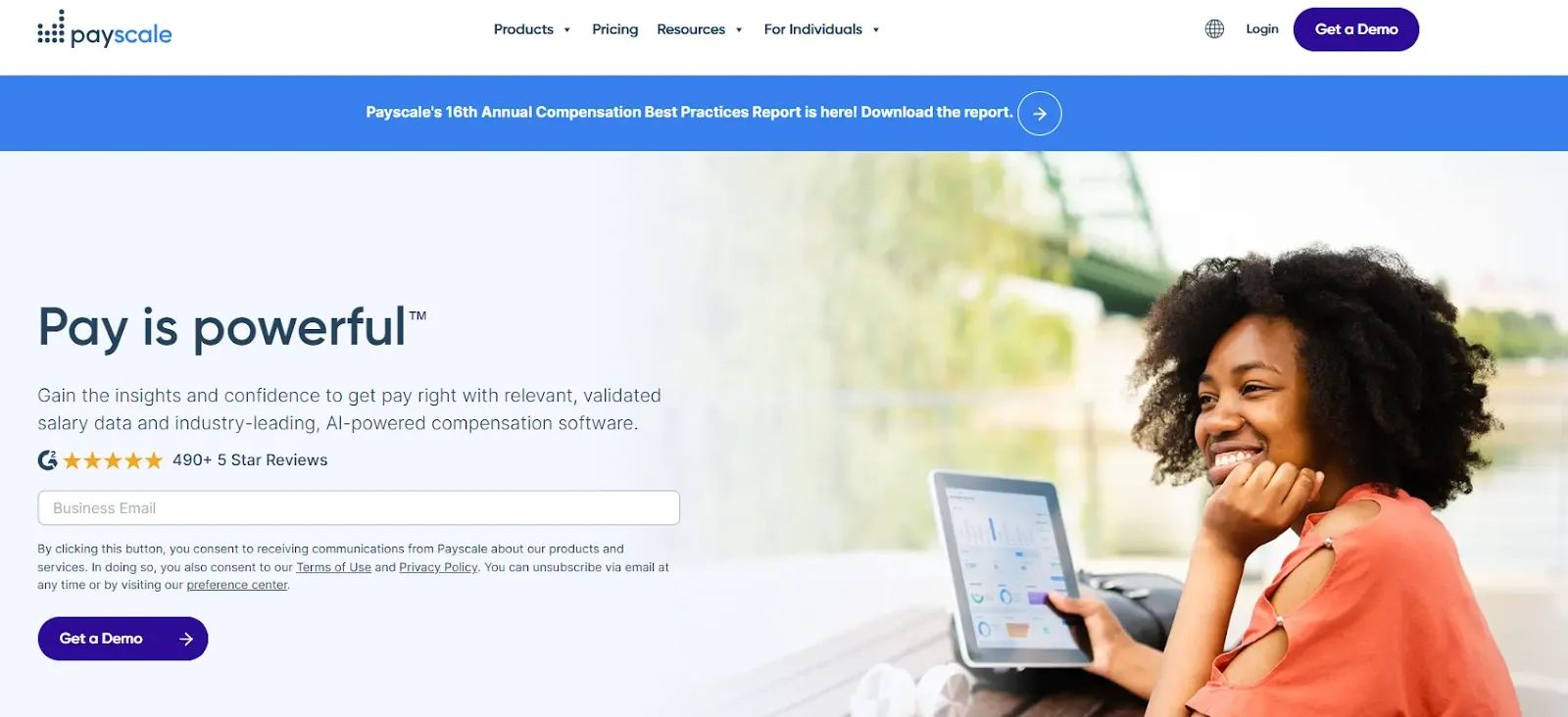
Payscale is one of the most widely used salary data platforms, offering real-time compensation insights based on employer-reported data. Unlike traditional salary surveys that are conducted annually, Payscale continuously updates its salary data, making it useful for businesses needing frequent compensation adjustments.
One of Payscale’s standout features is its interactive compensation software, which allows HR teams to analyze pay trends, create salary bands, and model different pay scenarios.
Why Choose Payscale?
If you need a flexible, budget-friendly compensation data source with frequent updates and interactive analytics, Payscale is a strong choice for businesses of all sizes.

CompUp Webinars | Deep Dive into Appraisal Season
Watch the 96-minute webinar featuring experts like Joel Sebastian from Esper.io, Anuj Vadehra from Lenskart, and Aman Gupta from Mobile Premier League as they discuss best practices and practical examples to optimize your appraisal planning and navigate the challenges of compensation data.
Best for: Businesses needing detailed job-specific compensation data
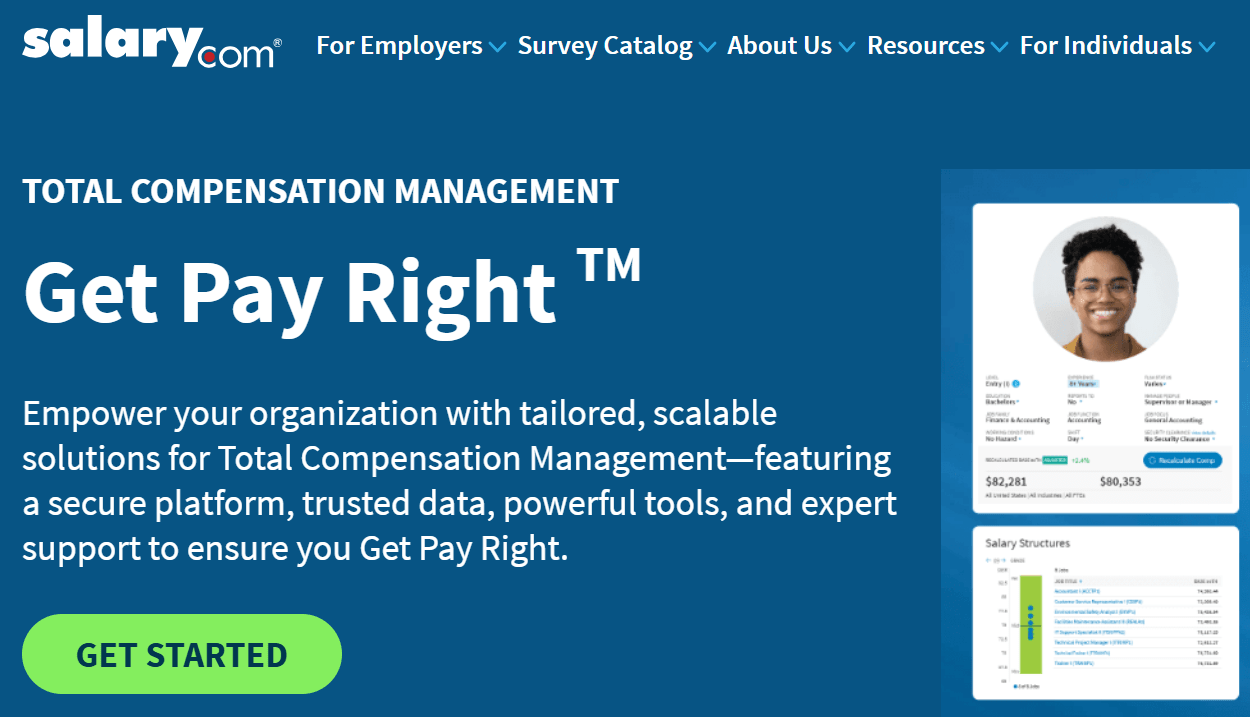
Salary.com provides detailed salary benchmarks for thousands of job roles across various industries. Unlike crowdsourced salary sites, Salary.com’s data comes from employer-reported compensation surveys, making it a more reliable source for structured pay data.
One of Salary.com’s biggest advantages is its CompAnalyst platform, which allows companies to benchmark salaries, manage pay structures, and track compensation trends in real time.
Businesses can refine salary data by job title, experience level, and location, ensuring specialized benchmarking for specific roles. Additionally, Salary.com offers customized reports, making it ideal for companies needing detailed salary planning tools.
Why Choose Salary.com?
For businesses that need structured, role-specific salary benchmarks with interactive compensation planning tools, Salary.com offers a comprehensive solution.
Suggested Read: Understanding the Concept of Total Rewards in HR
Best for: Finance, accounting, legal, marketing, and administrative roles
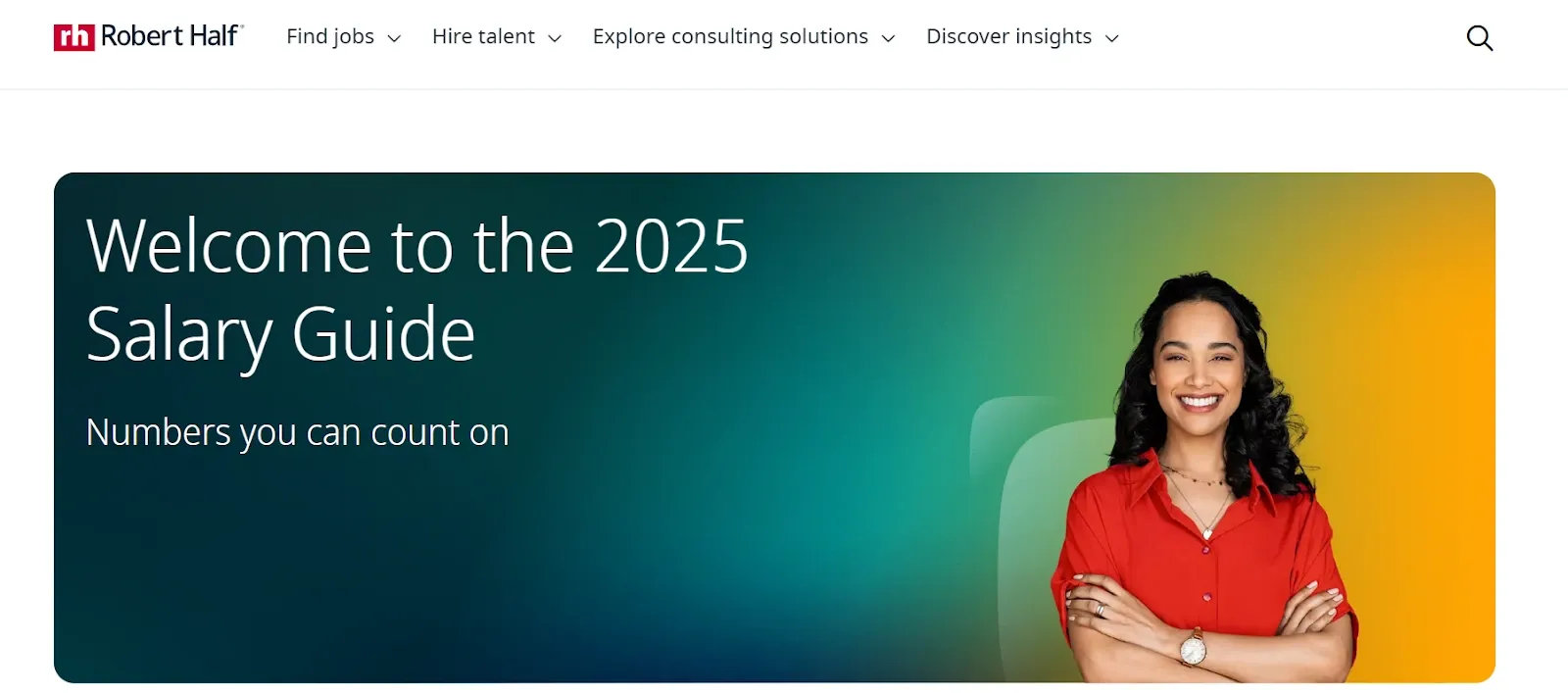
Robert Half’s Salary Guide is a trusted resource for compensation data in the finance, accounting, legal, and administrative industries. The reports are updated annually and provide insights into salary trends, hiring demand, and skill-based pay variations.
What makes Robert Half unique is its focus on real-world hiring data. The company operates as a staffing and recruitment firm, meaning its salary guides reflect actual compensation trends observed in the job market.
Their reports also break down salaries based on company size, industry demand, and geographic region, making them highly valuable for businesses hiring in specialized fields.
Why Choose Robert Half?
If you need reliable salary benchmarks for finance, accounting, legal, or marketing roles, Robert Half’s salary reports provide accurate, industry-backed insights.
The key takeaway is that no single salary survey provides all the answers. Now that we have explored the top salary survey companies, it's important to consider other valuable sources of salary data. These alternative resources can supplement your research and provide a broader perspective on compensation trends.
Suggested Read: How to Use Compensation Benchmarking Tools Fairly: Importance and Steps
Beyond the major players like Glassdoor and PayScale, there are several other valuable sources of salary data that HR professionals can explore. Websites like Indeed, ZipRecruiter, and SimplyHired aggregate salary information from job listings, providing a snapshot of what employers are offering for various roles across industries.
Additionally, government data from the U.S. Bureau of Labor Statistics (BLS) offers reliable, publicly available salary information across a wide range of occupations. It is an essential tool for understanding national compensation standards.
As you explore various salary survey data providers, one of the key considerations is cost. Understanding the pricing structure of compensation surveys will help you determine which option aligns best with your budget and data needs. Let’s take a closer look at how much a compensation survey typically costs.
The cost of a compensation survey can vary widely depending on several factors, including the provider, the scope of the survey, and the level of detail required.
On average, you can expect to pay:
After exploring the costs associated with compensation surveys, it’s equally important to assess the credibility of the survey data. Ensuring that the salary survey you choose is reputable will help you make informed, reliable compensation decisions.
When selecting a salary survey provider, it's essential to check that the data you are using is accurate, reliable, and relevant to your business needs.
Here are some key factors to consider when determining if a salary survey is reputable:
Now that we have explored the top salary survey companies, it's important to highlight why CompUp stands out in this space. With its unique features and capabilities, CompUp is redefining how companies approach compensation management and salary benchmarking.
In the crowded field of salary survey data providers, CompUp sets itself apart by offering an integrated, data-driven platform designed to improve compensation management while ensuring fairness, transparency, and efficiency. Here’s why CompUp stands out:
CompUp uses real-time data from multiple sources to ensure compensation decisions are based on the latest market trends. It integrates performance ratings, company budgets, and reward philosophies to calculate fair, competitive increments, giving HR teams the insights they need to make informed decisions.
One of CompUp's standout features is its Pay Equity tools, which help identify and address pay gaps across roles, demographics, and locations. By ensuring compensation fairness, CompUp helps organizations build diverse, inclusive, and equitable workplaces, which is an essential feature in today’s competitive job market.
CompUp offers customizable benchmarking tailored to your organization’s unique needs. Whether you are looking at specific roles, industries, or geographic locations, CompUp provides precise, relevant data that reflects the realities of your specific market segment.
CompUp integrates easily with popular HR systems like Bamboo HR, Lattice, and Culture Amp. This integration ensures a smooth flow of compensation data across platforms, allowing for better management and reporting. The platform also maintains the accuracy and relevance of the data.
CompUp provides a comprehensive solution for managing salary surveys along with annual increments, promotions, and compensation adjustments. With features like Compensation Bands and Budget Simulation, CompUp enables HR teams to forecast and strategize for reward allocations, ensuring they stay within budget while offering competitive pay.
CompUp goes beyond just salary data by offering Total Rewards management. This feature allows HR teams to visualize and manage the entire compensation package, including salary, bonuses, benefits, and non-monetary rewards.
With these powerful features, CompUp offers a more efficient, data-driven, and equitable approach to compensation management, setting it apart from traditional salary survey data providers. Its ability to integrate with existing systems, ensure pay equity, and provide real-time insights makes it an essential tool for HR teams in 2025.
Salary benchmarking is essential for attracting and retaining top talent, but raw salary data alone isn’t enough. Companies need to apply that data strategically, ensuring their compensation structures align with market trends, internal pay equity, and business goals.
CompUp offers a powerful solution by providing compensation insights that enable HR teams to create fair, competitive, and strategic pay structures. With features like pay equity analysis, customizable benchmarking, total rewards management, and integration with existing HR systems, CompUp enables organizations to make informed decisions that align with their long-term objectives.
Ready to strengthen your compensation strategy? Request a free demo of CompUp today and see how its advanced features can help you optimize your compensation management.
What is the most accurate salary survey?
The accuracy of a salary survey depends on the data source, sample size, and methodology used. Surveys from well-established salary survey companies like Mercer, Korn Ferry, and PayScale are generally considered highly reliable due to their large sample sizes and rigorous data collection processes.
How to get a salary survey?
Salary surveys can be obtained through compensation data providers like PayScale, Korn Ferry, and Salary Cube. You can either purchase individual reports or subscribe to ongoing access to updated data. Some industry associations also offer salary surveys tailored to specific sectors.
What is the best database for salaries?
The best database for salaries depends on your industry and needs. Popular and reliable databases include PayScale, Korn Ferry, and Glassdoor, which offer extensive salary data across various industries, job levels, and geographic regions.
Is an average salary survey reliable?
An average salary survey can provide a general benchmark, but it may not always capture variations in pay based on location, experience, or industry. For more accurate insights, it’s important to consider surveys that offer detailed data, including salary ranges and industry-specific breakdowns.
How does CompUp work with salary survey data?
CompUp is not a salary survey provider, but it helps businesses apply and manage salary survey data effectively. Instead of manually analyzing compensation reports, HR teams can upload salary survey data into CompUp, compare multiple benchmarks, and automate pay adjustments. This ensures faster, more accurate, and structured salary decisions.
Can CompUp integrate with multiple salary survey sources?
Yes! CompUp allows businesses to combine data from multiple salary survey providers (Mercer, WTW, Radford, Payscale, etc.) into a centralized compensation system. This makes it easy to cross-check salary benchmarks and create structured pay bands based on diverse data points.
Can CompUp be used without purchasing a salary survey?
Yes! While having external salary survey data improves benchmarking, CompUp can still be used to analyze internal pay structures, automate salary bands, and track pay equity trends even without third-party survey data.

Co-founder & CEO, CompUp
Anurag Dixit, founder of CompUp, is a seasoned expert in all things compensation and total rewards. With a deep understanding of the current compensation trends, his vision is to help companies create fair, transparent, and effective compensation strategies.
Revolutionizing Pay Strategies: Don't Miss Our Latest Blogs on Compensation Benchmarking